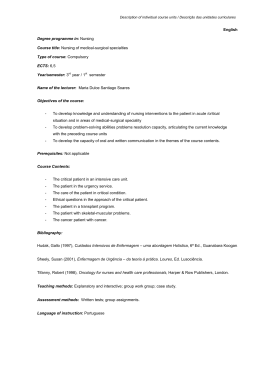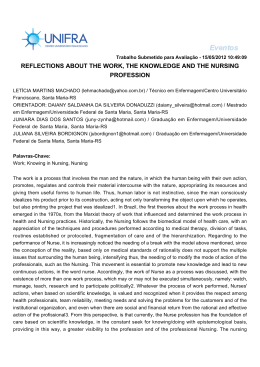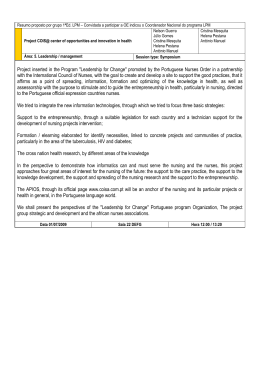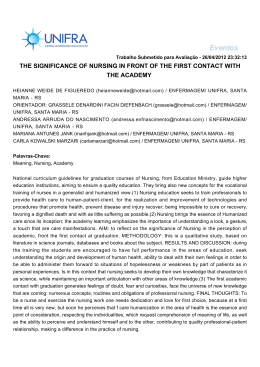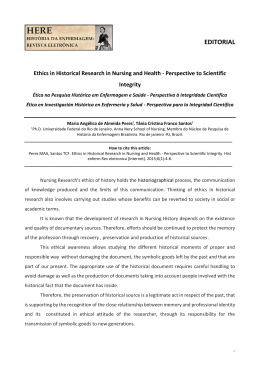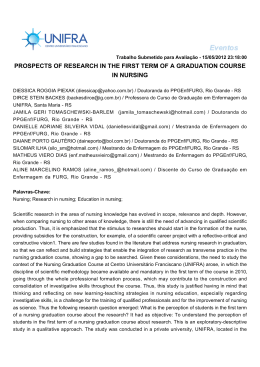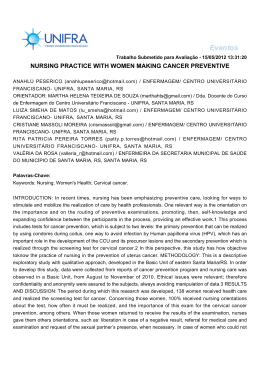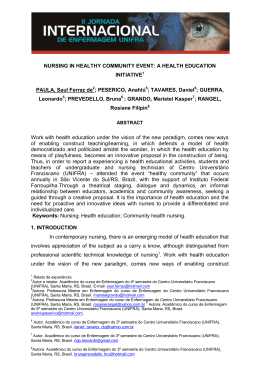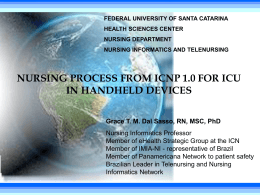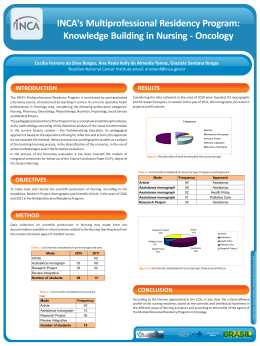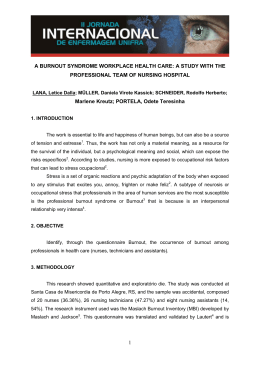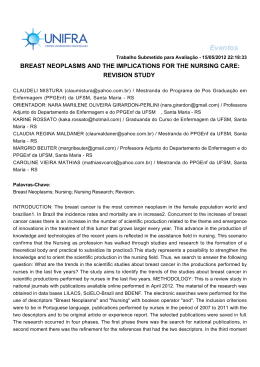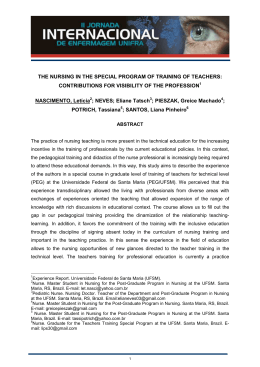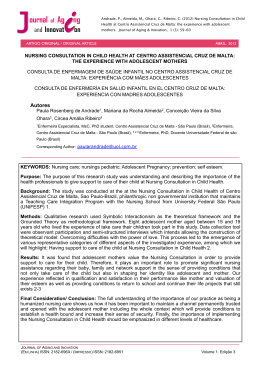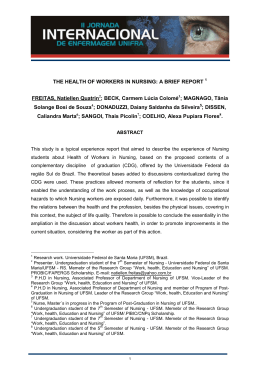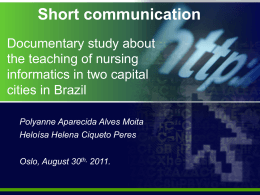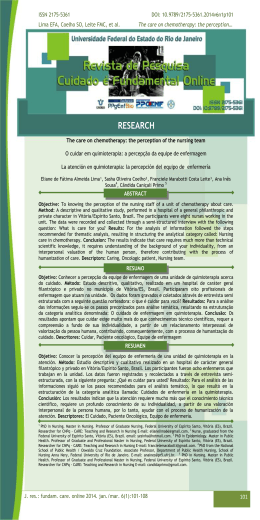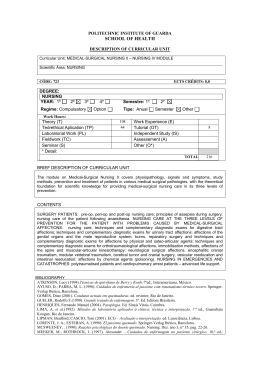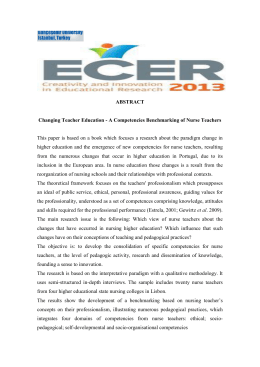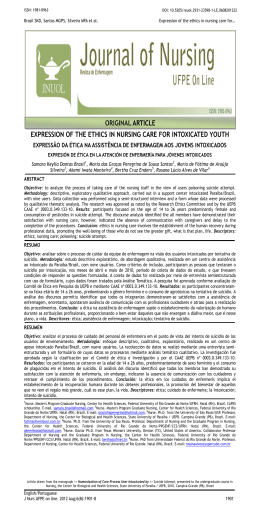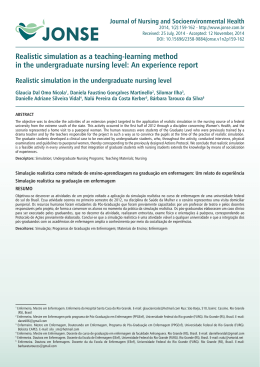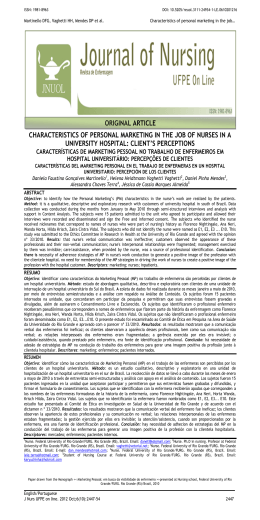BEING AN SCHOLARSHIP ASSISTANCE IN A UNIT MEDICAL CLINIC: AN EXPERIENCE REPORT ¹ MARTINS, Mayani Suertegaray2; GIRARDON-PERLINI, Nara Marilene Oliveira3; SANTOS, Naiana Oliveira dos4; DEBUS, Paula dos Santos5; MARTELLO, Naiashy Vanuzzi6 ABSTRACT The study addresses the perception of an academic nursing, before an experience as a scholarship assistance in a unit medical clinic at a teaching hospital in the central region of Rio Grande do Sul, in order to share the insights that experience possible. This emphasizes the relation between theory and practice, in line with personal experiences, strengthening the success of the practice of nursing care, as well as the training humanized of the professional nurse and broad vision made possible through the experience, as well as the development of the professional who want to be. This is a report of an experience where through the proximity of the professional reality, allowed the amplification of the restricted view to the college, improving technical and scientific knowledge, and professional identity construction based on experience. Keywords: Perception; Nursing Care; Learning RESUMO O estudo refere-se a um relato de experiência fundamentado na percepção de uma acadêmica de enfermagem, diante da vivência pessoal como bolsista assistencial em uma unidade de clínica médica de um hospital-escola da região central do Rio Grande do Sul. Ao compartilhar reflexões que a experiência possibilitou, enfatiza-se a relação teoria-prática, em consonância às experiências pessoais, corroborando para o crescimento acadêmico e profissional e o sucesso das práticas assistenciais de enfermagem. A imersão no cotidiano do cuidado como bolsista assistencial contribui para a formação científica, técnica e humanística do futuro enfermeiro, permitindo, ao longo da experiência, uma visão ampliada do contexto profissional, além de agregar elementos para a construção da identidade profissional. Descritores: Percepção; Cuidados de Enfermagem; Aprendizagem. 1. INTRODUCTION The experience reported has been developed in the University Hospital of Santa Maria (HUSM) through the Center for Teaching and Research (NEPES) which has an Institutional Program which offers scholarships to students in the area of health for a contribution to the training by offering the opportunity to carry out extracurricular activity remunerated in various sectors. In this sense, the students of the University of Santa Maria (UFSM) and other accredited institutions engage in activities, which they are responsible under the supervision of a responsible to sector where will carry the scholarships. Specifically nursing, the supervision is a nurse of, considering the ethical and legal rights in order to fulfill the responsibility and humanism to the patients. Being a professional nurse who holds a theoretical and practical, their academic learning process must pass necessarily, by theoretical and practical skills (knowing how) necessary for their formation, which occurs in the fields of stages¹. So the scholarship assistance allows you to emphasize the cohesion between the teaching and practice, since the academic appropriates the knowledge of the demands on existing building a professional identity, feels autonomous and responsible for nursing care. 2. OBJECTIVE It has as aimed reporting an experience of the experience like Scholarship Assistance in a unit medical clinic at a university hospital, from the perspective of an academic nursing. 3. METHODOLOGY This is an experience report based on the perception of an academic nursing program at the Federal University of Santa Maria, which for a period of nine months, from June 2011 to March 2012, experienced the condition of Scholarship Assistance. During this period was used as a tool to record remarkable experiences daily field and monthly activities, amounted altogether eighty-four of hours as the scale. The dynamics of work occurs based on the demand of the unit, there are activities restricted to nurses as well as, technical assistance to nursing. The Unit of Medical mentioned corresponds to the fifth floor of University Hospital of Santa Maria (HUSM), which has twenty-four beds, for both sexes, in the specialties of internal medicine, neurology, pulmonology, hematology-oncology, gastrologia, infectious diseases and cardiology. The choice of this unit adult, to experience the Scholarship Assistance as an alternative to complement and extension activities of the academy, took place from the theoretical and practical during the fourth semester of nursing degree, the approach with different specialties found in that Unit aroused the interest to learn more about each of them a scholarship through the experience of care in one location. 4. RESULTS The performance in the practical field, as a Scholarship Assistance, enabled better prepared not only to respect the technical expertise but also the individual preparation, considering the revision of values of life and expectations regarding the care provided. The Unit of clinical medic, given the diversity of medical specialties has, makes the possibility of learning based on practical even greater, since many pathologies and situations involving inpatient allow the expansion of academic view. The student's direct confrontation with the practice of nursing, from a multidimension vision care, promotes academic and professional maturity². In this sense, you can create a professional identity based on practical experience of scientific and starting also from personal experiences. The reality faced with numerous situations before unknown, that are not restricted only to the patient, but at the same context, considering his family and psychosocial situation raises reflections on professional practice and makes a call almost immediately to know order to pursue a humanized care, and so opt for the professional who want to be. Facing this, the act of caring in nursing involves the interaction of nurses with the client, which requires self-knowledge and knowledge that involving the touch sensitivity, the look, feel and know capturing the emotions of those who are caring for care³. It is noticed that the quality of care offered is closely linked to the sensitivity of those who do, in this case, the nursing student, because beyond their executives of the work being developed, the emotional side several times to assist in inner strength, based on his personal experiences, their emotions, fears, anxiety, fears and also the ability to deal with the words, as to the holistic care of the dialogue is essential. So, it is also important to be open to learning, so that sometimes the students are faced with situations not yet experienced, or which have not yet feel prepared, both in technical aspects, how to handle situations like death. These situations enrich the practice once that allow a closer approximation of the nurse activities and complement the academic preparation, since many the times the period or part of practical classes do not contemplate such situations with. As the have a greater mastery of techniques and skills of nursing, we begin to discover the learning needs further loss and means to solve them. Some strategies were adopted to enhance the academic experience and learning opportunities, develop action plans based on a survey of demands, approaching more specialized procedures that does not had contact, make dressing more specific to the systematization of care daily nursing, as well as having a technical look sensitive, encouraging a sense of autonomy. The process of autonomy presupposes that the nurse and the nursing staff may interfere with the process of setting priorities for assistance. The autonomy is based on the direction of the will of the individual to action, from social and cultural influences 4. An important dimension evident in this scenario refers to the responsibility and commitment on the actions of service provided. The activities developed as a fellow academic influence in shaping the future as nurses to promote the understanding of the role of these professionals, their duties and responsibilities and skills needed to develop as a professional, conscientious and able to provide health care. 5. FINAL CONSIDERATIONS The period of the experience as Scholarship Assistance in the Unit of Clinic Medical revealed possible contributions and implications that this experience can bring to the training. In view of the academic nurse who experienced it, this opportunity is essential to complement the activities of graduation. The activities allowed the necessary skills for the nursing care became clearer, and every day's experience, developed the safest and most appropriate. Was possible see more clearly the role of nurses in the health team. The approach to the activities of nurses were meeting the expectations regarding the academic profession, allowing part of routine work that adds in all aspects, resulting in personal satisfaction, safety practices, breadth of vision, discovery skills and sensitivity other. It is noteworthy that the challenges are constant over the life of academic and overcome each stage of the learning process requires discipline combined with studies to play a quality nursing care. Finally, we emphasize that, although limited in view of the generality, it is hoped that this experience report can collaborate in building strategies for strengthening education and training of nurses. 6. REFERENCES ¹COSTA, MLAS. Ensino de enfermagem no campo clinico: dificuldades relatadas por um grupo de professores. Acta Paul Enferm. 1997; 10(3): 55-61. ²ALONSO, ILK. O exercício de liberdade e autonomia na academia – uma prática pedagógica no estágio curricular supervisionado. Rev Bras Enferm. 2003; 56(5):570-573. 3 CALDAS, LMR. Um dia na UTI pediátrica: uma análise crítica. Revista Alternativa de Enfermagem. 1997; 2(5):22-26. 4 MORIN, E. A cabeça bem feita: repensar a reforma, reformar o pensamento. Tradução de E. Jacobina. 3ª ed. Rio de Janeiro (RJ): Bertrand Brasil; 2001.
Download
